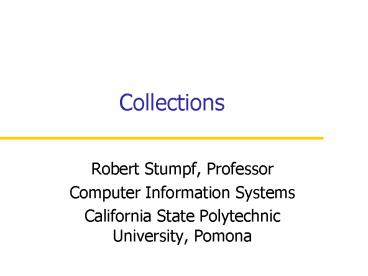Collections - PowerPoint PPT Presentation
1 / 18
Title:
Collections
Description:
There are three kinds of collections in Java: Arrays ... James Gosling (author) uses before. Patrick Naughton (author) uses after. 8/20/09. collections ... – PowerPoint PPT presentation
Number of Views:21
Avg rating:3.0/5.0
Title: Collections
1
Collections
- Robert Stumpf, Professor
- Computer Information Systems
- California State Polytechnic University, Pomona
2
Collections
- There are three kinds of collections in Java
- Arrays containing data types or objects
- Ordered Collections containing objects only
- Dictionaries containing objects only
- All three collections are objects
3
Arrays
- Can hold any data type or object
- The size is fixed during declaration
- For example
- int daysInMonth
- String monthNames
- To initialize
- daysInMonth new int 12
- monthNames new String 12
4
Arrays
- Alternate array declaration
- For example
- int daysInMonth
- String monthNames
- The choice of placing the brackets before or
after is a matter of style - James Gosling (author) uses before
- Patrick Naughton (author) uses after
5
Arrays
- To populate (beginning at zero)
- int daysInMonth new int 12
- daysInMonth 0 31
- daysInMonth 1 28
- and
- String monthNames new String 12
- monthNames 0 January
- monthNames 1 February
6
Arrays
- An alternate way to populate
- int daysInMonth 31, 28, 31, 30, 31, 30,
31, 31, 30, 31, 10, 31 - and
- String monthNames January February
March, April, May, June, July,
August, September, October, November,
December
7
Arrays
- Other information
- Length is obtained from a public static variable
as follows - int size1 monthNames.length
- int size2 daysInMonth.length
- It is recommended that the programmer always used
this class variable rather than a constant to
make maintenance easier
8
Ordered Collections
- In Java an Ordered Collection is called a Vector
- For example to declare and initialize
- Vector orderedCollection
- And initialize
- orderedCollection new Vector ( )
9
Ordered Collections
- To add to collection
- String string new String("Toyota")
- orderedCollection.add(string)
- To get from collection
- String string (String) orderedCollection.
get(0) - Remember an Vector can only hold objects
10
Ordered Collections
- To locate in collection
- String string new String("Toyota")
- if (orderedCollection.contains (string) ) int
index orderedCollection.indexOf ( string) - To find the size of a collection use
- int size orderedCollection.size ( )
- Remember a Vector may grow
11
Ordered Collections
- To iterate through a vectors values
- Iterator iterator
- iterator orderedCollection.iterator()
- while (iterator.hasNext())
- value (String) iterator.next()
- System.out.println ( "Value is " value)
12
Dictionaries
- In Java an Dictionary is called a Hashtable
- For example to declare and initialize
- Hashtable dictionary
- And initialize
- dictionary new Hashtable ( )
- Note the parent class of Hashtable is Dictionary
13
Dictionaries
- To add to a dictionary
- dictionary.put ("Sue", "3249")
- To get from dictionary
- String string (String) dictionary.get
("Sue") - Remember a Dictionary can only hold objects
- Remember a Dictionarys key must be an object
14
Dictionaries
- To find the size of a dictionary use
- int size dictionary.size ( )
- To check if key is not there
- String string (String)
dictionary.get ("Sue") - if (string null) System.out.println
("Not found " string) - Remember a Dictionary may grow
15
Dictionaries
- To iterate through a dictionaries keys
- iterator dictionary.keySet().iterator()
- while (iterator.hasNext())
- key (String) iterator.next()
- System.out.println("Key is " key)
16
Dictionaries
- To iterate through a dictionaries values
- iterator dictionary.values().iterator()
- while (iterator.hasNext())
- value (String) iterator.next()
- System.out.println("Value is " value)
17
Summary
- Remember arrays in Java are objects
- An Ordered Collection is called a Vector
- A Dictionary is called a Hash Table
- Arrays are fixed in size while Ordered
Collections and Dictionaries may grow - Arrays can hold data types while Ordered
Collections and Dictionaries hold objects
18
Thank You
- Collections are the workhorses of Java
- Any questions should be directed to Professor
Robert Stumpf - Email rvstumpf_at_csupomona.edu
- Web Sitehttp//www.csupomona.edu/rvstumpf































